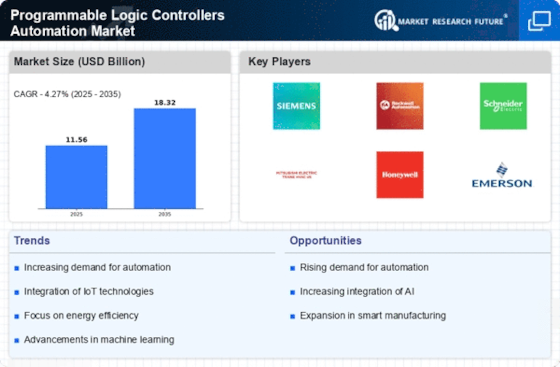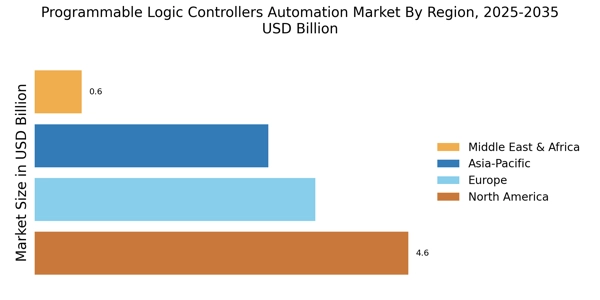Need for Enhanced Operational Efficiency
The pressing need for enhanced operational efficiency across various sectors is a significant driver for the Programmable Logic Controllers Automation Market. Organizations are increasingly recognizing the importance of optimizing their processes to remain competitive in a rapidly evolving market landscape. The implementation of PLCs allows for precise control and automation of machinery, which can lead to substantial reductions in operational costs. Data suggests that companies utilizing PLCs can achieve efficiency improvements of up to 30%, thereby enhancing their overall productivity. This focus on operational excellence is particularly evident in sectors such as automotive, food and beverage, and pharmaceuticals, where precision and reliability are paramount. As businesses continue to prioritize efficiency, the demand for PLCs is expected to grow, reinforcing their critical role in the automation market.
Advancements in Technology and Innovation
Technological advancements and continuous innovation are pivotal factors driving the Programmable Logic Controllers Automation Market. The evolution of PLC technology, including the introduction of more sophisticated and user-friendly interfaces, has made these systems increasingly accessible to a wider range of industries. Recent trends indicate that the market for PLCs is expected to grow significantly, with estimates suggesting a valuation of over $10 billion by 2026. Innovations such as cloud-based PLCs and enhanced connectivity features are transforming traditional automation practices, enabling seamless integration with other industrial systems. This technological evolution not only improves operational efficiency but also facilitates data-driven decision-making processes. As industries increasingly adopt these advanced PLC solutions, the demand for automation technologies is anticipated to rise, further driving the growth of the PLC market.
Growth of Smart Manufacturing Initiatives
The growth of smart manufacturing initiatives is a crucial driver for the Programmable Logic Controllers Automation Market. As industries embrace the concept of Industry 4.0, the integration of smart technologies into manufacturing processes is becoming increasingly prevalent. PLCs serve as the backbone of these smart manufacturing systems, enabling real-time data collection, analysis, and decision-making. Recent projections suggest that the smart manufacturing market could reach a valuation of over $300 billion by 2025, highlighting the significant role of automation technologies. The adoption of PLCs in smart factories facilitates enhanced connectivity and interoperability among machines, leading to improved production efficiency and flexibility. As the trend towards smart manufacturing continues to gain momentum, the demand for PLCs is expected to rise, further driving the automation market.
Regulatory Compliance and Safety Standards
Regulatory compliance and adherence to safety standards are increasingly influencing the Programmable Logic Controllers Automation Market. Industries are required to meet stringent regulations regarding safety, quality, and environmental impact, which necessitates the adoption of advanced automation solutions. PLCs are instrumental in ensuring compliance by providing accurate monitoring and control capabilities. Recent data indicates that sectors such as oil and gas, chemicals, and pharmaceuticals are particularly affected by these regulatory requirements, driving the demand for reliable automation systems. The ability of PLCs to facilitate compliance with safety standards not only mitigates risks but also enhances operational reliability. As regulatory pressures continue to mount, the reliance on PLCs for automation is likely to increase, further propelling the growth of the market.
Rising Demand for Automation in Manufacturing
The increasing demand for automation in manufacturing processes is a primary driver for the Programmable Logic Controllers Automation Market. As industries strive for enhanced efficiency and productivity, the adoption of programmable logic controllers (PLCs) has surged. According to recent data, the manufacturing sector is projected to witness a compound annual growth rate of approximately 8% over the next few years. This trend indicates a robust shift towards automation, where PLCs play a crucial role in streamlining operations, reducing human error, and optimizing resource utilization. The integration of PLCs allows manufacturers to achieve real-time monitoring and control, thereby enhancing overall operational performance. Consequently, the growing emphasis on automation in manufacturing is likely to propel the demand for PLCs, further solidifying their position within the automation market.
















